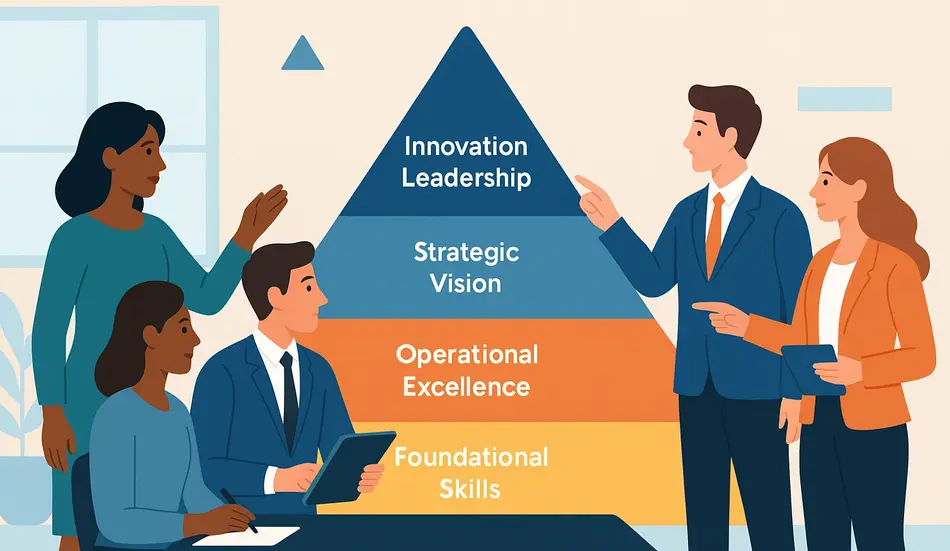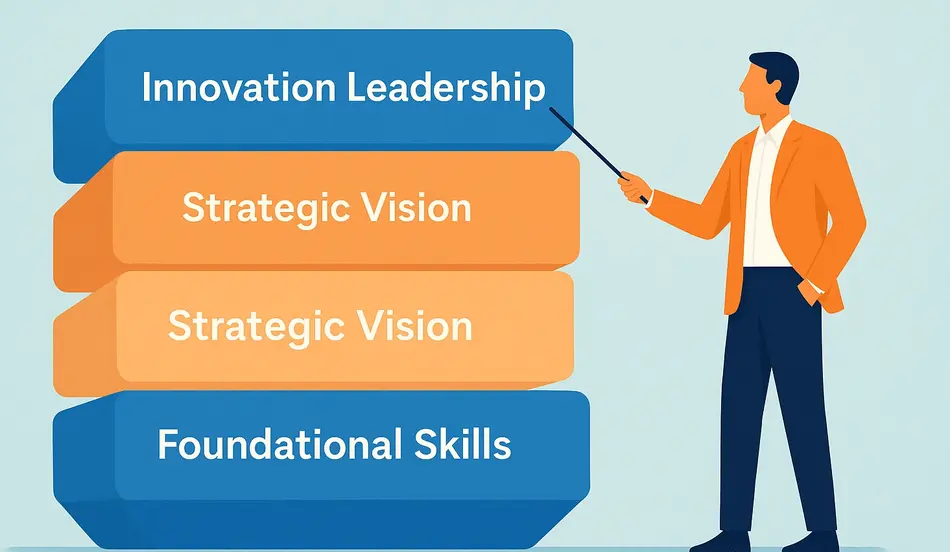Introduction: Rethinking Success in the AI Era
In today’s rapidly evolving economy, we’ve been sold a formula for success that’s increasingly outdated: get a degree, learn to code, memorize facts, and follow the rules. But while millions of students in India continue being trained the same way we were 30 years ago, understanding the wrapper economy has become essential for navigating the modern world. AI isn’t just changing how we work—it’s fundamentally altering how value is created and captured.
This misalignment between traditional education and the reality of today’s economy creates a dangerous gap in how we prepare for careers. To understand just how significant this gap is, let’s start with something seemingly simple: a cup of coffee.
The Coffee Stack: A Lesson in Economic Complexity
The Hidden Layers Behind Your Morning Latte
When you walk into Starbucks and order a latte, the transaction seems straightforward. Yet beneath this simple exchange lies one of the most intricate globally coordinated systems in human history—a perfect example of the wrapper economy in action.
A coffee shop doesn’t grow coffee beans, milk cows, or manufacture espresso machines. Instead, it wraps all these complex elements into a simple product you can purchase. This coffee shop depends on suppliers, who rely on shipping networks, who need factories, who source from farmers. Each layer in this stack depends on the one below it, creating a complex but functional system.
What makes Starbucks valuable isn’t that it’s doing something completely original—it’s that it wraps all this complexity into one simple transaction. This is what a wrapper does: it takes something complicated, hides the layers beneath it, and turns it into something accessible.
The Value of Abstraction in Business
The concept of wrappers isn’t limited to coffee. Every successful business wraps complexity into simplicity:
- Your smartphone wraps telecommunications infrastructure into a simple text message
- Netflix wraps broadcasting networks into an easy streaming experience
- Google search wraps the entire internet into a single search box
Each of these products sits atop a stack of its own, with multiple layers of technology and services beneath it. When you zoom out and consider not just one but millions of such stacks all interconnected and relying on each other, you begin to see what capitalism truly is: a system of wrappers all the way down.
The Software Misconception: Why “Just a Wrapper” Misses the Point
The Status Game in Technology
In the software world, there’s a strange contradiction. When developers see something built on existing software, they often dismiss it saying, “Oh, this is just a wrapper”—as if that somehow makes it less valuable. Yet React, Python, and C++ are all wrappers themselves, each abstracting away complexity at different levels.
This dismissive attitude reveals a fundamental misunderstanding of how value is created. No one criticizes Starbucks for not growing its own coffee beans. No one looks at Uber and says, “That’s just a wrapper around car owners.” Yet when it comes to software, people suddenly forget how the economy works.
The reality is that value doesn’t come from originality—it comes from making things accessible, simple, and useful. The more you abstract away complexity, the more value you potentially create.
The Educational Origins of Our Misconceptions
This mindset didn’t emerge from nowhere. It started in our schools, where we were taught that copying is bad and originality is everything. For decades, we looked down on countries that “only made copies” until they started making better products than those they were copying.
Our educational system rewards memorizing facts, following instructions, and chasing grades rather than pushing for deeper understanding. We developed a “viva-like” understanding of understanding—being able to answer rapid-fire questions without actually building anything.
This approach might have worked 20 years ago when information wasn’t readily available and memorization gave you an edge. But today, when specific information for your exact problem is available from an AI model in milliseconds, we need to reconsider what’s valuable.

Capitalism as a Stack of Wrappers: Rethinking Value Creation
Beyond Hard Work and Money
Contrary to popular belief, capitalism isn’t primarily about hard work or making money—it’s a stack of wrappers. Every modern tool exists because of countless layers of inventions that came before it, not just physical inventions but knowledge accumulated over generations.
When you make a cup of instant coffee, you have no idea who grew the beans, and they don’t know who you are. The entire supply chain functions without each participant knowing the entire system. Schools never explained capitalism this way—instead, they presented it as some grand abstract machine running on its own.
In reality, capitalism is just wrappers all the way down. People who build billion-dollar businesses aren’t necessarily the ones memorizing facts or doing foundational work—they’re the ones building the biggest wrappers, and the world rewards them massively for it.
Risk, Reward, and Position in the Stack
The higher up in the wrapper stack you operate, the more exposed you are to consumers. B2C businesses at the top take the most risk, handling consumer feedback and market fluctuations directly. They wrap the complexity of layers below and turn it into something accessible to end users.
This risk is why they capture the most value. B2B businesses one level down (like AWS providing cloud services) face lower risk but also capture less value. The lower down the wrapper you go, the more protected you are from consumer whims, but the less value you typically capture.
The topmost wrappers don’t just create and capture the most value—they keep the entire stack alive. Money trickles down from consumers to each layer, incentivizing every participant to do what they do best while distributing risk appropriately.
AI: The Ultimate Wrapper in the Modern Economy
How AI Changes the Wrapper Economy
With the rise of AI, understanding the wrapper economy becomes even more crucial. AI itself is a wrapper—it takes complexity and makes it accessible. Rather than replacing all human work, it’s primarily replacing people who aren’t very good at what they do, while empowering those who are reasonably skilled to accomplish much more.
Instead of hiring five people to provide a service, you can now use AI tools to achieve similar results. This fundamentally changes how capitalism works, but the principles remain the same: use what society gives you, add more value, and make it convenient for the end consumer.
Many people feel that using AI is “cheating” because it feels like you’re using someone else’s work. But society has always worked this way—it rewards people who build something useful on top of existing foundations. Facebook built on MySpace and Friendster; Google built its search engine on top of the open web; UPI wrapped the existing financial system into something more convenient.
The Island Thought Experiment
Imagine being dropped on an island and asked to build a modern app from scratch. You’d need React, which requires JavaScript, which runs on engines like V8 (written in C++), which is built on C, which compiles to assembly, which is a wrapper around machine code.
Even if you could code in binary, you’d need a computer with a processor (requiring silicon extraction), electricity, and an operating system. The point is clear: nobody starts from scratch. Everyone stands on thousands of years of human invention.
Every modern tool exists because of countless layers of inventions and knowledge. The underlying work doesn’t disappear with AI—it’s still there. Wrappers simply take care of the lower-level stuff so you can focus on higher-level creative work.

Coordination: The Ultimate Skill in the Wrapper Economy
Beyond Solo Genius
College fails to teach the one skill that matters most at the highest levels: coordination. Our education system glorifies the idea of the solo genius who builds everything from scratch, but that’s a myth. The higher you go, the less it’s about doing everything yourself and more about orchestrating people, systems, and resources.
The more wrappers exist, the more pieces there are to coordinate, and the higher you go in the stack, the more valuable coordination becomes. This explains why content creators can now generate wealth comparable to entrepreneurs—they’re coordinators connecting talent, projects, teams, products, and advertising services.
The Money Is in Coordination
The biggest wrapper—where the most money is made in the economy—is coordination. You don’t make money by knowing things; you make money by applying what you know and fixing problems. Yet India remains a “viva-driven culture” focused on quiz-like knowledge rather than application.
This is why sales and marketing people deserve more respect than they typically receive in India. Sales and marketing aren’t secondary functions—they’re the coordination between products and customers that makes the difference between a world-changing product and one that gets forgotten.
Without marketing and sales—without someone packaging and advertising your solution properly—even a cure for cancer would struggle to gain acceptance. The ability to coordinate and communicate value is fundamental to economic success.
Articulation: The Essential Skill for the AI Age
The New Critical Capability
As AI tools become more prevalent, articulation emerges as perhaps the most crucial skill. It’s not about pressing a button—it’s about clearly expressing what you want the AI to do. You’re coordinating ideas, models, prompts, files, apps, and tools, tweaking outputs until you get what you need.
This requires a deep understanding of how to combine different elements to achieve your goals. Unfortunately, our education system doesn’t teach us how to think in systems or articulate ideas clearly. Instead, it forces memorization of concepts without teaching how they connect.
The Articulation Gap
The articulation problem is significant in India, where over 27% of people (more than 400 million) struggle with basic comprehension. Many can read words but cannot make sense of complete sentences or understand deeper meanings—a fundamental barrier to using AI effectively.
When using AI, you’re not just pressing a button; you’re directing a complex system. This requires clear communication and an understanding of how different components work together—skills our education system rarely develops.
Practical Application: Building with AI Through Articulation
From Concept to Creation
Consider this practical example: using an AI-enabled tool to create an educational app that visually explains Einstein’s space-time continuum. By clearly articulating what you want—”create an interactive 3D website showing a slightly tilted green space-time fabric on a black background”—you can quickly generate a functional prototype.
But articulation becomes critical when refining the details. When the AI places the curvature based on the planet’s initial drop position rather than its current center, making the distortion look off, the problem isn’t with the AI—it’s with the clarity of instruction.
By specifying that “the center of the curvature should always track the center of the planet in real time,” you get exactly what you need. Similarly, when objects pass through the fabric instead of staying on it, adding “lock the X-axis so objects stay on the fabric and don’t pass through it” solves the problem instantly.
The Air-Bending Analogy
This new relationship with technology is like “air bending” from Avatar—you’re not creating the elements, but directing them where you want them to go. It’s similar to being a sailor who doesn’t control the storm or water but can navigate through it effectively.
Success today isn’t about learning isolated concepts—it’s about integration, understanding how ideas connect, how wrappers work, and how layers function together. Knowledge is just one part of the ecosystem; what matters is application.
FAQ: Navigating the Wrapper Economy
How does understanding the wrapper economy help my career?
Understanding the wrapper economy fundamentally changes how you approach career development. Rather than focusing solely on technical skills that AI might eventually automate, you’ll recognize the value of building on existing tools and technologies to create accessible solutions. This perspective helps you identify where to position yourself in various value stacks, whether creating new wrappers that simplify complex processes or developing coordination skills that become increasingly valuable as technology advances.
Isn’t building “just a wrapper” less valuable than creating something truly original?
This common misconception misunderstands how value is created in the modern economy. Almost nothing is truly original—everything builds on existing foundations. The most successful companies in the world (Apple, Google, Amazon) didn’t invent completely new technologies; they wrapped existing technologies in ways that made them more accessible, useful, and valuable to consumers. The wrapper economy rewards those who can take complexity and make it simple and useful, not those who start from scratch.
How can I develop better articulation skills for working with AI?
Improving articulation for AI interaction requires practice in systems thinking—understanding how different components connect and influence each other. Start by breaking complex problems into smaller, clearly defined parts. Practice explaining concepts to others until they understand completely. When working with AI tools, be specific about outcomes rather than processes, and iteratively refine your instructions based on results. Remember that precision matters—the difference between “create a curvature beneath the planet” and “ensure the center of the curvature tracks the center of the planet in real time” can be significant in the wrapper economy.
What skills should I focus on developing in the AI era?
In the wrapper economy enhanced by AI, prioritize coordination skills (orchestrating resources, people, and systems), articulation (clearly communicating ideas and requirements), systems thinking (understanding how components interconnect), and adaptation (quickly pivoting as technology evolves). Technical knowledge remains valuable but shifts from implementation to direction—knowing enough to effectively guide AI tools rather than doing everything manually. Additionally, develop domain expertise in specific fields where you can provide context and judgment that AI currently lacks.
Need Career Advice?
The transition to an AI-powered wrapper economy requires new thinking about careers and skills. Whether you’re just starting your professional journey or looking to adapt to these changes, understanding these fundamental shifts is crucial for long-term success.
Visit our Career Guidance Center for personalized support in navigating your career in the wrapper economy and AI era.
Hiring Wrapper Economy Experts?
Looking for professionals who understand how layers of value creation work in today’s economy? Post jobs for free with WhatJobs and connect with forward-thinking candidates who grasp the principles of the wrapper economy and can help your business thrive in this new landscape. Start recruiting innovative talent today!






